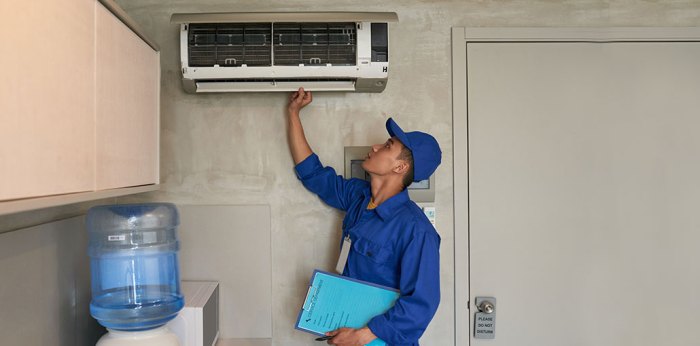Liability Insurance for HVAC Contractors: Everything You Need
As Liability Insurance for HVAC Contractors: Everything You Need takes center stage, this opening passage beckons readers with a formal yet engaging tone into a world crafted with good knowledge, ensuring a reading experience that is both absorbing and distinctly original.
The content of the second paragraph that provides descriptive and clear information about the topic
Understanding Liability Insurance for HVAC Contractors
Liability insurance is a crucial aspect for HVAC contractors as it provides financial protection in case of unforeseen circumstances. It helps cover the costs associated with legal claims and damages, ensuring that contractors can continue their business operations smoothly.
Types of Liabilities for HVAC Contractors
- General Liability: Protects contractors against third-party claims of bodily injury, property damage, and personal injury.
- Professional Liability: Covers claims related to errors or negligence in the services provided.
- Product Liability: Guards against claims arising from faulty HVAC equipment or parts.
Examples of Situations where Liability Insurance is Essential
- If a technician accidentally damages a client's property while installing an HVAC system, liability insurance can cover the repair costs.
- In case a customer suffers an injury due to a faulty repair job, liability insurance can help cover medical expenses and legal fees.
- If a contractor is sued for providing incorrect advice that leads to financial losses for a client, professional liability insurance can offer protection.
Coverage Offered by Liability Insurance
Liability insurance for HVAC contractors typically includes a range of coverage options to protect them from various risks and liabilities. It is crucial for contractors to understand the types of coverage offered in their policies to ensure they have adequate protection in place.
Types of Coverage Included
- General Liability Insurance: Provides coverage for third-party bodily injury, property damage, and advertising injury claims that may arise during HVAC projects.
- Professional Liability Insurance: Also known as errors and omissions insurance, this coverage protects HVAC contractors against claims of negligence or inadequate work performance.
- Product Liability Insurance: Covers liabilities related to any products installed or sold by HVAC contractors that may cause harm or damage.
- Completed Operations Insurance: Protects contractors from claims that arise after a project is completed, such as faulty installations or repairs.
General vs. Professional Liability Insurance
- General liability insurance focuses on claims related to bodily injury, property damage, and advertising injury, while professional liability insurance is specific to claims of negligence or errors in professional services.
- Professional liability insurance is crucial for HVAC contractors who provide design, consulting, or advice services, as general liability may not cover these types of claims.
- Both types of insurance are essential for comprehensive coverage, as they address different aspects of liability risks in HVAC contracting.
Importance of Adequate Coverage Limits
Having adequate coverage limits in liability insurance policies is critical for HVAC contractors to protect their businesses from potentially costly claims and lawsuits. Insufficient coverage limits may leave contractors vulnerable to financial risks and liabilities that could result in significant losses.
By ensuring adequate coverage limits, contractors can have peace of mind knowing they are well-protected against unforeseen circumstances in their line of work.
Factors to Consider When Choosing Liability Insurance
When selecting a liability insurance policy, HVAC contractors need to take into account several key factors to ensure they have adequate coverage based on the size and nature of their business. It is crucial to review policy exclusions and limitations before making a purchase to avoid any surprises in the event of a claim.
Size and Nature of HVAC Business Impact
The size and nature of the HVAC business play a significant role in determining the type and amount of liability insurance needed. Larger companies with more employees and equipment may require higher coverage limits to protect against potential risks
- Consider the number of employees: Larger HVAC companies with multiple employees may need coverage for liability arising from employee actions or negligence.
- Evaluate the scope of operations: Contractors offering specialized services or working on high-risk projects may need additional coverage to protect against potential claims.
- Assess the value of equipment and assets: Contractors with expensive equipment or valuable assets should ensure they have sufficient coverage to replace or repair damaged property.
Reviewing Policy Exclusions and Limitations
Before purchasing liability insurance, it is essential to carefully review the policy exclusions and limitations to understand what is covered and what is not. Pay close attention to any specific exclusions that may leave your business vulnerable to certain risks.
Additionally, be aware of any limitations on coverage amounts or types of claims that may impact your ability to file a successful claim.
It is crucial to have a clear understanding of what your liability insurance policy covers to avoid any surprises during the claims process.
Cost and Benefits of Liability Insurance
When it comes to liability insurance for HVAC contractors, understanding the costs and benefits is essential for making informed decisions.
Cost of Liability Insurance
The typical cost range of liability insurance for HVAC contractors can vary depending on several factors such as the size of the business, coverage limits, location, claim history, and services offered. On average, HVAC contractors can expect to pay anywhere from $500 to $2,000 per year for liability insurance.
Benefits of Having Liability Insurance
- Protection against lawsuits: Liability insurance can provide coverage in case a contractor is sued for property damage, bodily injury, or other related claims.
- Peace of mind: Knowing that you are protected financially in case of unforeseen circumstances can give HVAC contractors peace of mind while conducting their business.
- Professionalism: Having liability insurance can showcase to clients that you are a professional and responsible contractor, potentially increasing trust and credibility.
Managing Insurance Costs
While it is important to have adequate coverage, HVAC contractors can take steps to manage their insurance costs:
- Compare quotes from multiple insurance providers to find the best rates.
- Focus on risk management to reduce the likelihood of claims and potentially lower premiums.
- Consider bundling insurance policies or choosing higher deductibles to save on costs.
- Regularly review and update coverage to ensure it aligns with the current needs of the business.
Epilogue

The content of the concluding paragraph that provides a summary and last thoughts in an engaging manner
FAQ Corner
What are the common types of coverage included in liability insurance for HVAC contractors?
Common types of coverage include general liability, professional liability, and property damage coverage.
How can HVAC contractors manage their insurance costs while maintaining adequate coverage?
HVAC contractors can manage insurance costs by bundling policies, implementing safety measures, and periodically reviewing coverage needs.
Continue this structure for all FAQs




